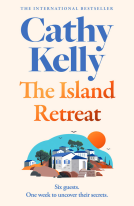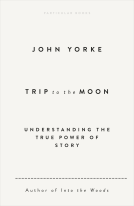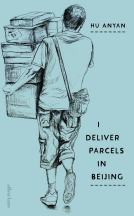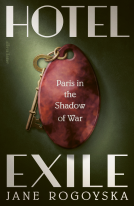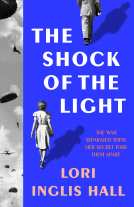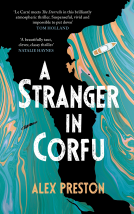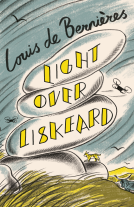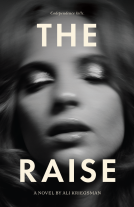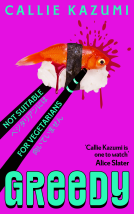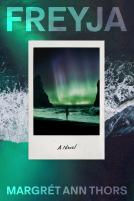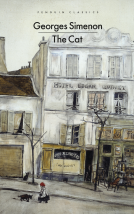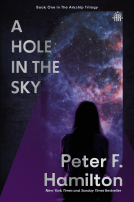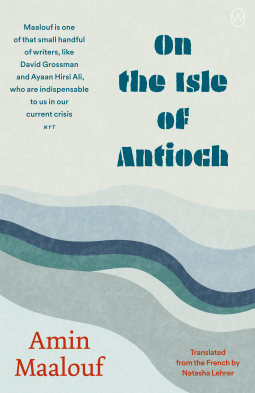
On the Isle of Antioch
by Amin Maalouf
This title was previously available on NetGalley and is now archived.
Send NetGalley books directly to your Kindle or Kindle app
1
To read on a Kindle or Kindle app, please add kindle@netgalley.com as an approved email address to receive files in your Amazon account. Click here for step-by-step instructions.
2
Also find your Kindle email address within your Amazon account, and enter it here.
Pub Date 5 Dec 2023 | Archive Date 1 Dec 2023
Talking about this book? Use #OntheIsleofAntioch #NetGalley. More hashtag tips!
Description
"Lebanese-born French author Maalouf delivers an elegant portrait of a dying world. A beguiling, lyrical work of speculative fiction by a writer of international importance." —Kirkus Reviews, *Starred Review*
Alec, a press artist with an impressive track record, settles on a remote island in the Atlantic Ocean. He has little contact with his neighbor, a solitary woman who wrote a cult book years ago, before withdrawing from public life. That is, until a gigantic power failure cuts them off from the rest of the world, and all of a sudden they find themselves dependent on each other. The world appears to be on the brink of nuclear war and the collapse of civilization seems imminent. Just who are the mysterious friends of Empedocles, the gang of otherworldly protectors who came swooping in to interfere with the US presidency and cure all illness? Should we trust them? On the Isle of Antioch is a suspenseful novel with mythological roots, written in the dreamy language of the classics, by internationally renowned scholar Amin Maalouf.
Advance Praise
Praise for Amin Maalouf
“Maalouf is a thoughtful, humane and passionate interlocutor.” —New York Times Book Review
“Amin Maalouf is one of that small handful of writers, like David Grossman and Ayaan Hirsi Ali, who are indispensable to us in our current crisis.” —New York Times
“Maalouf’s fiction offers both a model for the future and a caution, a way towards cultural understanding and an appalling measure of the consequences of failure. His is a voice which Europe cannot afford to ignore.” —The Guardian
Marketing Plan
- A dystopian novel about total collapse, for readers of Station Eleven by Emily St. John Mandel, Leave the World Behind by Rumaan Alam and American War by Omar El Akkad
- Advance galleys and digital reader copies
- Digital assets including trailer & author video
- Signed book plates available
- National TV, radio, print, and online review campaign
- Consumer-facing national advertising campaign on Shelf Awareness, Lithub, NPR, Foreword Reviews, Goodreads
- Virtual or in-person author events
- Book club discussion guide
- Bookstore co-op available
- Excerpt placement
- Social-media campaign & Goodreads Giveaway
Available Editions
| EDITION | Other Format |
| ISBN | 9781642861341 |
| PRICE | $18.99 (USD) |
| PAGES | 288 |
Available on NetGalley
Average rating from 57 members
Featured Reviews
 Kyle C, Reviewer
Kyle C, Reviewer
If you read this as conventional dystopian genre-fiction, you will find this an absurd and baffling novel. Alexandre, a syndicated cartoonist, retires to his inherited private island, Antioch, a small piece of a Canadian archipelago. His only neighbour is Eve, an alcoholic misanthropic writer (her first book was a polarizing success, earning popular praise but scathing critical attacks, and she looks back on her novel chillingly as "the ceiling of her prison cell"). Each day Alexandre travels to a larger shoreline town by a small skiff chartered by a mysterious ferryman, who has a Greek name, Agamemnon, but looks Native American and has a dazzling knowledge of contemporary literature. One day, all the radios go silent. As Alexandre will soon learn from his friend, who is a close advisor to the US president (incidentally dying of terminal cancer), the world has been taken over by an advanced human civilization, calling itself the "friends of Empedocles", which has decided to enforce rapid nuclear disarmament in order to save humanity from self-destruction. They claim to have preserved the wisdom of Ancient Greece and they memorize the verses of Empedocles.
Much of the plot is implausible—high-tech lasers which can paralyze anyone from long distance, healing tubes which can forestall death, a secret seafaring cabal of philhellenic super-humans, and at the center of it all, a lonely island-dwelling illustrator who is somehow one degree of separation away from both the White House and the society itself; somehow he knows what it going on in the president's office and also knows one of the friends of Empedocles. But it would be a mistake to read this novel as just another scifi gadget novel with shiny weapons and alien powers. As some of the French reviews noted when it came out in 2020 (I just read a review in La Croix), this novel is in the style of "conte philosophique", satirical, irrealic, speculative, philosophical. It's not interested in plausibility but in big-picture ideas—what would happen if human society were confronted with a superior version of itself?
In essence, this novel cleverly turns colonialism upside-down: in this story, the western world now sees itself as the indigenous "primitives". Alexandre wonders whether all their science, culture and language will simply be exotic curiosities to this vastly superior culture. He worries that everything he has learned, everything that he cherishes, will simply become the contemporary equivalent of the wall etchings of Lascaux, the rudimentary drawings of Paleolithic proto-culture. When a doctor witnesses the mesmerizing medical science of these "friends of Empedocles", he decides to quit his profession altogether; everything he has learned is now obsolete. How is he any different from the acupuncturist, the witchdoctor or the Shaman, so often the object of professional derision? So it's not at all a sci-fi novel or geopolitical thriller; it's a novel that turns the colonial gaze back onto the reader, to question the haughty complacency of the western world and to recast modern humanity, and especially American empire, as a devolved simian monster tragically equipped with nuclear warheads.
It's a weird read. A fast-paced thriller but also a pure-hearted fable.
 Marika H, Reviewer
Marika H, Reviewer
Amin Maalouf delivers another incisive and beautiful book, and a fresh take on the apocalypse read. A good choice for readers of Emily St. John Mandel.
Alec is a successful illustrator who settles on a remote Atlantic island, content to live a secluded life, hardly even interacting with the island’s only other inhabitant. When the island loses power, radio and phone signal, we are let in on the broader world. Maalouf lays out a world that seems at the brink of nuclear war, until the mysterious and possibly other-worldly friends of Empedocles intervene to avert nuclear disaster, and reveal technology capable of curing illness and aging.
The epistolary narrative works for me. We get the sense of a narrow lens and of broader events beyond what we can see. It is beautifully written, unsurprisingly given Maalouf’s recognition as a Great Author.
 Reviewer 854813
Reviewer 854813
This was a really beautiful book that had me wanting more. Amin Maalouf is an exceptional talent and I think this books is a rare gem. Loved it.
 Jane T, Reviewer
Jane T, Reviewer
I found the book quite gripping. In the first few chapters you think you're about to read an apocalypse novel, albeit an original one - the protagonist on his Caribbean (or wherever) island with just one drunken, anti-social novelist for company as the world ends. Then you realise that it's not the apocalypse - or at least not quite yet - in fact the world's been sort of taken over by a benevolent cult of ancient Greeks. I've always had a soft spot for ancient Greeks, so this in particular kept me reading...and reading.
Apart from being a page turner, the book raised some interesting questions about how we would behave if a benevolent, but immeasurably superior, culture chose to intervene in our affairs. As the protagonist says at one point, it's like the Spanish meeting up with Montezuma, or any number of 'native' cultures encountering advanced European people with guns. Except that in this case Americans are the 'natives', and the incoming powers that be are actually better than us in every way.
So, a thought-provoking page-turner - I'd happily read another Maalouf novel.
Thanks to World Editions and NetGalley for supplying and ARC of Amin Maalouf's 'On the Isle of Antioch' for review.
To my embarrassment I had not previously heard of Maalouf but I was intrigued by the cover, title, and blurb of 'On the Isle of Antioch.'
On a nearly remote island just barely off the coast of France, a cartoonist finds himself dealing with a possible nuclear apocalypse. The power goes as does the internet, phones, and radio. What other explanation could there be given the ratcheting up of state and terrorist rhetoric around nuclear weapons.
Turns out it's something much more unexpected and earth-shattering. A group of seemingly far-evolved humans have come to save their less-advanced cousins from themselves.
The tone is lovely and gentle while dealing with some very heavy and harsh realities - pandemic, the rejection of a cure (for everything), violent nationalism, xenophobia, racism, violence.
There's a welcome undercurrent of hope throughout which is unusual in a seemingly dystopian novel.
There's an engaging cast of core characters and it's all very believable.
I felt like the story and the novel fizzled out somewhat at the end but, nevertheless, I'm glad to have been introduced to Maalouf and his writing, albeit in translation.
 louisa t, Reviewer
louisa t, Reviewer
I liked the first bit better I think, when we didn't know exactly what was going on and we're getting to know our characters and settings.
The rest was enjoyable enough, but I just feel like I didn't really connect with the story so didn't get the best out of it.
 Book Trade Professional 804678
Book Trade Professional 804678
really clumsy translation but if you can look past that there's a very unique story here. interesting stuff
 Joseph C, Reviewer
Joseph C, Reviewer
About twenty years ago, a friend had lent me Amin Maalouf’s Balthasar’s Odyssey. Two decades later, the details of the plot escape me, but I still recall being entranced by a novel which was at once a wildly gripping narrative and an intellectually satisfying work. I hadn’t read any Maalouf since then, so I had great expectations about his latest novel, On the Isle of Antioch. Its protagonist and narrator is “Alec Zander”, a lawyer turned cartoonist who, as a result of a strange quirk of family history, owns the greater part of Antioch, a remote island in the Atlantic. The island is linked to a the larger neighbouring island through a causeway which appears at low tide. Otherwise, Alec is all alone, except for Ève, a reclusive and misanthropic female author who owns another part of Antioch, and who has settled there to escape attention, following the publication of a cult work of fiction in her youth. One day, there is a massive power failure, accompanied by a breakdown in internet and radio communication. Alec suspects that a long-feared nuclear armageddon has arrived. It eventually results that behind these unprecedented events there is a mysterious and highly-advanced society of individuals who call themselves the Friends of Empedocles, and who appear to be inspired by the values of the Ancient Greeks. The Friends of Empedocles declare that they come in peace. But can they be trusted and does their advent signal the collapse of civilisation as we know it?
Certainly, the novel’s premise is promising. Here is Amin Maalouf, a veritable and venerable man of letters, taking on a hoary trope of dystopian/post-apocalyptic fiction and turning it into a philosophical meditation on the state of humanity. Yet, I found the novel ultimately underwhelming. Let me try to explain why.
So, first, the plot. Maalouf goes for a first person narration, which certainly makes matters more exciting and “immersive”. But for the purposes of plot development, the novel’s protagonist needs to double as a third-person omniscient narrator. To justify this, Maalouf relies on a series of extraordinary coincidences. Alec lives on a remote island. Yet, his only neighbour turns out to be the “muse” of the Friends of Empedocles, one of his friends is a member of the shadowy group and, to top it all, the closest advisor of the President of the US happens to be an old companion from University, such that, ironically Alec becomes probably the best-informed person in the world about the cataclysmic developments. In my view, even the most “speculative” of “speculative fiction”, needs to follow an internal logic to be credible, and sometimes this novel simply requires too much suspension of disbelief.
The novel borrows popular and genre fiction, and I’m perfectly fine with that. There’s action, dystopian thrills, and some romance. But the narrative arc seems to fizzle out. Without revealing too many details of the plot, there is some closure from the perspective of the narrator, but many questions remain unanswered. In other words, whoever reads this merely for the thrill of the tale will likely end up disappointed.
As for its philosophical ruminations, the novel does raise some interesting queries about contemporary society, the decline of civilisation, the diffident encounters between cultures. But these themes are alluded to without being considered too deeply.
Don’t get me wrong. I can’t say I disliked the novel. After all, Maalouf on a bad day is still better than most. But equally I cannot shake off a sense that On the Isle of Antioch could have been much more.
https://endsoftheword.blogspot.com/2023/05/on-isle-of-antioch-by-amin-maalouf.html
I felt really quite conflicted about this novel ,there were some elements I really enjoyed but ultimately I found it a highly confusing reading experience
The novel starts routinely and realistically setting up an island location off the coast of the uk where only 2 people live their neighbours can only be reached by boat or by a causeway only accessible at low tide .An unexplained episode happens which cuts off all contact with the outside world .You assume as reader that you will eventually have the episode explained .
Gradually you learn of some individuals who are in some way supernatural who gain control of world order
I was confused were these people aliens or was there a supernatural explanation .I found the politics unbelievable and was generally rather lost whilst I read
There is a very sudden ending which I found highly unsatisfactory.The novel left me feeling rather stupid and cross with myself for not following the story more easily consequently I couldn’t really recommend it to anyone
I read an early copy on NetGalley uk the book is published in the uk On 5th December 2023 by World Editions
This review will be published on Goodreads NetGalley uk and on my book blog bionicsarahsbooks.Wordpress.Com
 Reviewer 733502
Reviewer 733502
Thank you Netgalley for a free copy of this e-book in exchange for an honest review.
My first Amin Maalouf and definitely not my last. I have to give props the translator, Natasha Lehrer. I didn't have any of the issues I usually do with translated fiction.
This was a kind of post-apocalyptic, pandemic feeling type story. The prose was unique given that this book is written in diary form. It was very atmospheric and visually enticing. You could feel the chill and warmth throughout.
At the end of it all, this reminded me of Popisho and most of Emily St. John Mandel's books.
I will for SURE be picking up more books by this author. Maybe in Arabic too?
Translated from the original French Nos Freres Inattendus (Our Unexpected Brothers), On the Isle of Antioch is a strange little novel from respected French-Lebanese writer Maalouf that straddles different genres - literary fiction, speculative fiction, a religious allegory with elements of Greek mythology, all combined into a fable for these troubled times we live in.
Alec Zander is an artist and cartoonist who has given up law and economics to live a life of relative solitude on the island of Antioch, part of a (fictional) archipelago of islands off the coast of France. With a catastrophic nuclear event having cut off power to the island, Alec is living in uncertain times but through contact from a friend who works with the US President, Alec finds out that the worst case scenario has not materialised, owing to the intervention of a group of humans who appear to be related to the Ancient Greeks and who have developed methods of super-healing that can ward off death.
If it sounds strange, it is, but it is also very readable. Had it been longer than around 200 pages, I might not have continued but I am glad I did, even if it didn't fully work for me, leaning too much into religion as salvation for the human race. It does place an emphasis on humanity though, something that feels sorely lacking in the world right now. There are many quotable parts that resonated:
"Are you ready to think of death as your only enemy? Yes death, only death. Not rival powers, not other peoples, not other races. Not us. Only death. The single enemy worth fighting, wrestling with, defeating."
"Every time a traditional culture has come into contact with a more powerful and sophisticated society, a portion of humanity has experienced a kind of ending of their world."
3.5/5 stars
*Many thanks to World Editions for the arc via @netgalley. On the Isle of Antioch was published last week. As always, this is an honest review.
 Polly K, Reviewer
Polly K, Reviewer
As my first book by this author, I was glad to discover this one. Two very different people find themselves dependent on the other as a power failure grips their isolated island, and civilization is threatened. Definitely looking for more by this impressive author.
 Reviewer 446334
Reviewer 446334
"On The Isle of Antioch" ambitiously blends various mythologies, delving into interpersonal and societal issues against a futuristic dystopian backdrop. The story revolves around Alec, a lawyer-turned-cartoonist, and Eve, his solitary neighbor, as they face a power outage and societal collapse. The attempt to merge a wide spectrum of influences, references, genres, and themes feels incoherent, resulting in surface-level exploration. While it may find favor in literary circles appreciating deeper connections, the novel's reliance on extensive pre-existing knowledge may limit its accessibility and detract from its potential impact.
 b j, Educator
b j, Educator
Such an interesting and unique read . A well constructed book with just the right number of key characters and a very clever way of linking them together. If only such a tribe existed the world would appreciate it Really enjoyable read
My thanks to the publisher and Netgalley for my free digital ARC!
3.5 stars
On the Isle of Antioch is a quiet, philosophical take on the dystopian novel. It's written as journal entries by a cartoonist who lives alone, save for his one neighbour, on a remote island called Antioch. One seemingly normal day, the power goes out and the radio emits only a high-pitched whistling. It's revealed that the US president has been contacted by a people called the Empedocles, apparent descendents of the ancient Greeks, with the offer to destroy all the world's nuclear weapons to avoid an imminent catastrophe. The Empedocles' science is far beyond our own, and the world is on the brink of a complete overhaul.
I'm not sure I completely got everything that was being put down, but I enjoyed this thought-provoking read nonetheless. I've read other reviews with the critique that the book glorifies colonialism, but I felt like it was more of a warning. Given the author's Franco-Lebanese background, I would also find this surprising. The book explores the idea of the world as it is now being confronted with a 'superior' race of beings. The US, the traditional coloniser, now finds itself on the brink of being colonised itself. I found the role reversal to be a warning of such ideas, of one group of people believing themselves and their culture to be 'above' another's.
I've also read reviews on Netgalley critiquing the translation, but I personally found it engaging and natural to read. My own critique is that some things felt too convenient. Alec, the cartoonist, has a friend very conveniently placed in the US president's entourage. He just phones him up and the friend gives him all the details of what's going on with no care for security clearance or the like... Likewise his relationship with his neighbour Eve goes from cold to very intimate too quickly.
In terms of making you think though, I would recommend!
An interesting book that is part cosy romance and part cosy romantic philosophy, wrapped in a dystopian bag.
The opening is strong and I like it very much. A successful newspaper cartoonist lives on an isolated island and, one day while he is working, the light bulb flickers and fades along with all other forms of technology such as the internet and radio. All electricity and power is gone. So he checks on his only neighbour, an equally solitary alcoholic writer.
Timely in as much as the fear of nuclear war and terrorism is right now, plus the fear of the loss of power and - shock, horror, the internet - this is one of those tales that hangs over us all. But the nice thing about this story is the idea that maybe the 'invaders' desire a power for good and not evil. Wouldn't that be nice.
This is a well written book with warmth and gentle suspense, in part down to the excellent abilities of the translator. Presented as four notebooks written by the cartoonist, he writes is observations without judgement but ponders a world where death isn't feared and the potential consequences of that. He considers the rise and fall of civilisations, society, health and human relationships. Ironically, the end is exactly what I believe is likely to happen should this story ever become a reality.
A pleasant and enjoyable read with many things to think about. Recommended.
 Harish P, Reviewer
Harish P, Reviewer
The novel works as a philosophical reflection on our past, present, and future as a human race. It makes us aware of our past, which built an empire through trial and error and by spending blood and sacrifice. But the past has led to the present, which makes us rely on an egoistic leadership that never thinks of us as a whole and a community that is ready to follow like sheep when someone offers a quick fix solution. As individuals, each of us has an eventual certainty of the future, but as a collective, we are anxious and unsure of it. The novel indicates a trail that may eventually lead us to a better place than our presence—a trail that's marked by increased empathy and cooperation between us.
The more I read, the more I realize how much I like speculative fiction. The near but not quite real future always feels so fresh, and this book is no exception. I particularly enjoyed how the titular island plays such a central role in the shaping of the story—removed from the mainland, removed from communication except for a fuzzy radio, yet somehow the hub of a global experience.
I didn't find the main character to be very interesting—he was not particularly likable, and his thought processes worked somewhat differently than my own, but I didn't find him off-putting enough to take away from the story. The writing as a whole had a similar feel to some older classics, where the action takes place largely in retrospect (as if the story were being documented in a diary).
I think this book might be a good fit for fans of The Memory Police, The Remains of the Day, or possibly Severance (without feeling quite as bleak).
This was quite different from what I expected. I also have a headache so I'm gonna keep this review short lol. I liked how this story was told in a journal format and from only the main characters perspective. I did not expect this to be filled with so much philosophical and moral dilemmas.
Overall really cool, weird, dystopian science fiction. I was at some points annoyed how the author wrote women clearly from a straight cis man perspective, but overall this was quite pleasant reading experience.
An interesting read with some philosophy concepts as well. A political conflict, historical issues on government ruling, then some touch on dystopian and health crisis all encompassed in this 288 pages of the book.
Can also be a good book study.
Thank you at Netgalley and World Edition for the ARC.
3.5/5 stars
In "On the Isle of Antioch," Amin Maalouf presents a dystopian world grappling with a total social collapse and the enigmatic arrival of the Empedocles, figures from ancient Greek mythology who possess the ability to cure all illnesses. The story centers on Alec, an illustrator, and Eve, a writer, the only residents of the Isle of Antioch, an isolated archipelago near France. Their experiences offer a microcosmic view of the broader, chaotic world events and the profound impact of the Empedocles on human knowledge, identity, and dignity.
As a reader, I found the novel's premise intriguing and its philosophical depth compelling. However, the narrative left me with unanswered questions about the origins and motivations of the Empedocles, which somewhat diminished my satisfaction. Despite this, the novel's unique blend of mystery and speculative elements makes it an engaging read. I give it three stars, appreciating its thought-provoking content but desiring a deeper exploration of its fascinating world.
 Librarian 875611
Librarian 875611
Thank you to NetGalley, the publisher, and the author for giving me a free eARC of this book to read in exchange for my review!
 Alexa M, Reviewer
Alexa M, Reviewer
Thanks to NetGalley and the publisher for an advance copy of this book with no obligation to review.
I enjoyed reading this book and it has lingered in my mind but I am not entirely sure what to make of it.
I try not to recount the story of a book because that is what the blurb is for and i try not to give spoilers so I find that in this instance there is not much i can say. I feel that all the events of the book are somehow taking place behind a mist or fog that never blows away and I cannot help but think that there is more to it than I have picked up on.
Alec is well drawn and believable but I am not so sure about Eve who seemed quite insubstantial to me as did the mysterious ferryman Agamemnon but this might be deliberate. I also think that the blurb is a bit misleading as I don't feel that Alec and Eve are dependent on each other, they simply come together as the only inhabitants of the small island and Eve seems closer to the friends of Empedocles than to Alec.
Really, we don't even know if this is/will be a dystopian society, it could be just an largely unchanged society or even a Utopian one depending on what the friends of Empedocles do. The book ends quite abruptly and I suppose Alec and Eve are Adam and Eve in a new world order.
The book is compared to Station Eleven and Leave the World Behind, two books i really enjoyed, but I don't agree. In its misty, opaque style I would say it owes more to the Glass Hotel and although it is a bit like Leave the World behind, it is less graspable and uncertain.
It is certainly well worth reading and I feel I might very well read it again..
 Michelle P, Reviewer
Michelle P, Reviewer
I read this book months ago and am still thinking about it. On the Isle of Antioch is one of the most brilliant works of fiction I have ever read. THE prophetic novel for our time. It feels as if it was written 20 years in the future by a someone in possession of an otherworldly knowledge.
 Educator 675361
Educator 675361
When I requested this book from NetGalley, I was intrigued by the premise even though it is not the type of fiction I normally gravitate towards. I have to admit that I had it for awhile before I chose to read it. What a wonderful book. It was written from the viewpoint of a reclusive cartoonist in his journal based on his observations of what was happening around him. I absolutely loved it! I highly recommend this book to anyone who appreciates good storytelling.
Thank you to Net Galley and World Editions for an ARC in exchange for an honest review.
On the Isle of Antioch takes place on a small and isolated archipelago, where a comic artist has settled. It is told through his daily diary entries, which can be difficult to pull off, but the author seems to have no trouble creating a believable voice. The description is a bit misleading, his island is inhabited by just him and one other person, but they have access to a larger island through a causeway at low-tide. It is not so much of a doomsday armageddon tale as I first thought. He and Eve (the other Antioch settler) do form a stronger relationship because of the technology blackout, however he forms relationships with others on the island, as well as welcomes his niece and her boyfriend to the island later in the novel.
I thought the "friends of Empedocles" were a very fresh take on the idea of a more advanced group of beings coming into contact with our society. I enjoyed the political allegory involved when considering how the USA (an otherwise untouched global superpower) would react if they were unseated from their position in the world.
I also bought in to the love story, and specifically enjoyed how it seemed to form naturally. This quote exemplifies this energy the two main characters have between them:
‘How to resist the urge to believe her? How to resist the urge to love her?’
Unfortunately, I didn't quite like the turn the story took where (view spoiler). I thought it felt patched onto the end where it wasn't entirely necessary.
Overall, I really enjoyed this book. It was captivating, and I wanted to continue learning with the characters about the mysterious new people who had suddenly emerged. I will definitely be reading more of Maalouf's work.
 James M, Reviewer
James M, Reviewer
3.5/5
I think this book is far more bizarre than it was meant to be. It’s almost as if it has an identity crisis. Different genres can me mixed and mashed of course but the focus shouldn’t waver. This one’s did. In the end it was mediocre to ok.
 Reviewer 881263
Reviewer 881263
Thank you to Netgalley and World Editions for a copy of this book.
Alec is a press artist choosing an isolated life on a remote island, the only other inhabitant, fellow recluse, Ève. A sudden powercut finds them cut of from the rest off the world; global nuclear war and the collapse of civilisation seems imminent.
Then comes of the appearance of more evolved humans, 'The Friends of Empedocles', claiming they have the ability to cure any disease.
This book introduces many interesting ideas, but thanks to the writing style, I feel like they're not properly and I frequently found myself bored and unable to care about the plot.
In summary: great ideas, poor execution.
 Peter W, Reviewer
Peter W, Reviewer
Aamer Hussein says of Amin Malouf that he weaves extraordinary tales in his novels, mixing historical events, romantic love, fantasy and imagination.
This has never been more true than in his latest work On the Isle of Antioch.
If you are a lover of any of the genre that this praise implies is present in this work, don't worry about them being diluted by the presence of the other aspects, they are not.
All of the aspects work together to create a fantastic whole.
If only this story was true...
Thanks to the author for a brilliant novel and thanks to the publisher for an advance reading copy for honest review.
"In this dystopian novel about total collapse by author Amin Maalouf, a complete blackout hits a small island with only two solitary inhabitants, who suddenly have to depend on each other."
This was a very interesting read, which saw characters respond to a world-changing, global event whilst the earth is on the brink of nuclear war. This book definitely wasn't what I was expecting. With the novel taking the form of diary entries as the MC responds to events around him, I was expecting to see more of the personal, practical challenges faced by individuals in the apocalypse. Instead, he often captured the wider events on the political stage which were interesting in their own way.
At points, this novel was super engaging but occasionally lost itself. I thought it had a really strong second half and I was gripped to my kindle for most of it.
 Grace H, Reviewer
Grace H, Reviewer
In terms of big picture ideas, a lot about this book is intriguing (dystopia, presocratic philosophy, turning colonialism on its head), but I really struggled to get into it. I found a lot of it absurd, which I guess is the point, but the absurdity detracted from the exploration of themes and ideas for me. It’s certainly an interesting book, and it’s striving for a lot.
Let’s start this review thanking NetGalley and the publisher for the access to this book. This is a beautiful written dystopia. I sense it will be hard to read to some people and hard to get it but I did enjoy it lots. For start I loved The epistolary narrative. I think we need recognise Maalouf’s as a Great Author. Because in this book he did brilliant, I like the parallel concepts in the book, the whole book is such a creative one and I need this kinda books in the literature now days. The book is easy to read since the mail character is the narrator and that may be something simple but I love it. I like the sense that it tackles colonialism in a peculiarly way and I am one of those ones who always enjoy that kinda of things.
 Educator 1179425
Educator 1179425
As a teacher of world literature, I’m always on the lookout for works in translation that are high-interest but that also challenge students and that can provide a lens for students to understand their lives and the world around them. This title meets these requirements. It encourages students to consider how we relate to the world around us, how our perception of the world shapes our reality, and the degree to which we must depend on others. Definitely, I title I might consider recommending to students in the future.
I loved this dystopian novel and really found the whole premise to be inspired and creative. I really enjoyed the relationship of the main character as narrator throughout and found that it helped to create a very easy reading enjoyable story. The setting is unique as are the visitors, what a unique concept of a parallel mandkind. If you enjoy dystopian novels this one is worth a read. I found myself talking about it to others for many days after finishing it.
This book started off strong with this guy, Alec Zander, living almost alone on the remote island of Antioch. He only has one neighbor, a woman he doesn't even know. When picking this book, I hoped there would be something about Greece, considering the name of the island. And there was! First, I thought the Earth was taken over by aliens. Then I got to meet those strange people, all carrying famous Greek names and I started to wonder what was truly going on. This is a philosophical book that questions us and our civilization, who we are as peoples: did we accomplish what we were supposed to? Do we still have a long way to go? What are we chasing?
It was a good book but I got a bit bored 70% into it; the pace slowed down dramatically and nothing of interest was still happening.
Thank you Net Galley and the publisher for this advanced copy in exchange of my honest opinion.

